#the book has a movie adaptation but her character is DRASTICALLY DIFFERENT IN IT
Explore tagged Tumblr posts
Text
not another.... book f/o......
#Proship Selfship#waaaaaaaaugh fuck my stupid baka life#but I loooooooooooooove her#the book has a movie adaptation but her character is DRASTICALLY DIFFERENT IN IT#if you follow my main you know what I'm talking about#suffering suffering all alone in My F/O has no content to reblog hell#I'm going to stop reading this is getting upsetting#....#I could never stop reading I checked out more books today after returning hers I love you library
3 notes
·
View notes
Text
i will never understand how or why the httyd movies did the books such an injustice.
the movies aren't even an adaptation - they stole the name of the series, the name of some of the characters and places, and the general idea that there are dragons. honestly, i would be fine with the movies and maybe even like them if they didn't capitalize off of cressida cowell's incredible books that never get any credit.
the books are an amazing story about the cycle of violence and how vengeance and revenge is dangerous. hiccup says that the past is a ghost story, one we need to learn from to better ourselves. the books are about how everyone deserves freedom, how every creature, every being on the earth deserves to be free. we see that in the slavemark, with the dragons.
and like... hiccup is so different. they did him a severe injustice. he's scrawny and intelligent and learned to talk to dragons simply by observing them! he chooses kindness first above all else; instead of yelling at toothless to train him, he is kind. and in the end, that kindness is why toothless chose to save him. bc even toothless himself says that dragons are inherently selfish creatures who care only for their survival. hiccup is brave - his beliefs differ drastically from both the vikings and the world.
hiccup is a child who chose to do the right thing even at the expense of himself. he agreed to free the slaves on nobert's ship, and in return, they gave him the slavemark which is easy to give but cannot be removed. he was like twelve. and having the slavemark means he cannot be with his tribe or his family, it means he isn't considered a human being anymore. and he keeps it a secret for awhile until it's revealed and when it is everyone turns their backs on hiccup. his family, his tribe, his mentor, people he TRUSTED. everyone except fishlegs, and, once she got over the shock, camicazi. he was thirteen. and even when he lost his memories and was really injured, he persisted. he was told to go to tomorrow and to save the dragons and he did bc in his heart he knew it was right even though he didn't know who he was or how he got there.
and fishlegs,,, oh my god FISHLEGS!!! the did him SO DIRTY!!! fishlegs is hiccup's best friend, one of the main motivators for hiccup. he steals norbert's potato for the sake of fishlegs, he gives fishlegs his dragon and goes to retrieve another, he takes the blame for fishlegs. and fishlegs does the same for him. he takes the slavemark with pride. he refuses to turn. he gives hiccup his lobster claw necklace which is his most prized possession. he is brave for hiccup, he believes hiccup is alive. he fights for hiccup harder than anyone else ever has. he does not turn. his is loyal, has allergies, has asthma, has a squint and a limp, has glasses bc he's blind without them... and he's still a hero despite being a runt, despite everyone even the adults telling him he's hopeless, telling hiccup to leave him behind.
and they cut camicazi! i'm sorry, but astr*d is nothing compared to camicazi. camicazi is a tiny, feral child who can easily best hiccup, fishlegs, and pretty much anyone in a sword fight. she can bring a grown man to tears with her rudery and smack talk. she is recklessly brave and craves adventure and follows hiccup blindly bc she trusts him that much. she isn't in love with hiccup - in fact she doesn't care about romance and love. she gives up everything to help hiccup bc she has a strong sense of justice. she is the motivator, the cheerleader, she finds a positive in everything. she never gives up. literally never gives up. and that's one of the most inspiring things about her: she always has hope.
and toothless! god!!! toothless is *thought to be* a common or garden dragon. he is horrifically tiny, he is literally toothless, and is the biggest brat in the world. he will cause problems on purpose. he has a stutter, he's the most selfless selfish dragon around. he and hiccup can talk to each other. he masks his fear with singing and being annoying. his growth is remarkable. he starts off refusing to obey hiccup, doing the opposite of what he says, making life harder for literally everyone around him, and he's still somewhat like that. but he's also braver, more caring, more willing to make sacrifices for the sake of others. he's clever, which he needs to be to make up for his size and aggression. he protects hiccup with everything he has, therefore, he protects what hiccup cares about just as hard. he was the only dragon that didn't abandon the vikings in the first book bc he cared about hiccup.
and snotlout,,, god,,, i will never forgive the movies for butchering snotlout. hiccup's cousin, the bully character, the one who is horrifically jealous that hiccup's dad was born before his. the one who desperately wants to prove himself, to be worthy, to make people proud. and you hate him, you despise him. he betrays everyone many times bc of the nothing promised to him by alvin and his mom. he loses himself, turns his back on himself, all bc he wants to prove himself. all bc he wants to be better than hiccup. and hiccup still forgives him and gives him chances, sometimes out of pity, but also bc snotlout is his cousin. he can't just turn his back on him no matter how miserable snotlout made his life. and in the end, snotlout sacrifices himself for hiccup. he gives up his life for hiccup in one last attempt to set things right. his death and the events preceding it are one of my absolute favorite moments in the book. gives me chills. makes me cry.
that's the thing with the books - they're so realistic. there is no inherently happy ending where everything works out. the first book begins with "there were dragons when i was a boy", implying that they're gone now. the books show there are consequences to our actions. they enslaved the dragons, they fought against them during the dragon rebellion all bc alvin and his mom said to, and now they're gone bc a simple apology doesn't fix hundreds of years of enslavement. and the only way for the world to move forward was for the dragons to leave and heal on their own. and now they have to learn to live without them. and yeah i've heard the third movie ends like that but. it doesn't have the build up. it doesn't have "there were dragons when i was a boy". it doesn't have eleven books of development to back it up, to make it feel meaningful.
i know that the movies are really special to a lot of people. i know that, on their own, they're genuinely good movies. i can acknowledge that the soundtrack is amazing and the animation is beautiful. i just can't see past the way they butchered the world that i love, the world that i grew up with. i can't see past the way people yelled at me for saying i liked the books better, the way that people gave me weird looks when i showed them a picture of the original toothless, when i tell them that nightfuries aren't even a type of dragon. cressida cowell created hundreds of different dragons, and the movies couldn't even pick from that. i can't forgive the way that barely anyone knows there are books bc the movie barely gives credit to them. i cannot forgive the way they capitalized off the books and then shoved them aside. i know cressida thinks they're good movies and i know a lot of httyd book fans also like them. but i just... i cannot get over how much they changed and how they missed so much and ignored the books. also they got rid of camicazi so hiccup could have a love interest and that is unforgivable to me.
if you disagree, that is a-okay. we're all entitled to our own opinions. i just ask that you, perhaps, try the books out. give them a chance. bc they're amazing works of art and also just like. don't yell at people who don't like the movies? whether it's bc they prefer the books or just aren't into that kind of movie. and just remember that dreamworks didn't come up with the story; cressida cowell did.
#corey talks:)#this has been in my drafts forever but i saw something that made me have feelings and so i finished it and here take this iuygfcvghuij#i justgod the books are SO GOOD and barely anyone knows theyexist#and i think that's what makes me the kost upset#or some [people chose to ignore they exist or don't give them a chance bc... i don't even know why. ppl are just so quick to dismiss them#the books are so important to me (literally got a httyd book tattoo) and i get most book fans also like the movies#but it sucks bc i can't go through the httyd tag without being bombarded with movie stuff#i'll even look up 'httyd books' and half of it is still about the movies.#i'll look up snotface snotlout and only finds movie stuff even tho ig they changed his last name in the movies???#i'll look up camicazi and find it filled with astr*d. WHAT.#i'll look u toothless and only see the freaking nightfury. not the original.#like god movie enjoyers at least tag correctly. i get you want ppl to see your posts but the more i see movie stuff in the book tag the mor#i hate the movies lol like the movies are so much more popular than the books let us have our tags okay#sorry if any of this sounds bitter also i hope it doesn't sound like i want to argue or fight#this is just my opinion and i have feelings and i just want ppl to know there are books#also i am not shaming anyone who likes the movies like i already said you do you boo just don't come at me for doing me#bc yes that has happened to me multiple times :) which is one reason why i get so upset :)#i just personally cannot separate the two. i know some ppl can and i'm glad! but i can't and that's okay too#httyd#httyd books
71 notes
·
View notes
Note
Never thought a show could get worse with their writing decisions till now, because literally what are they doing, so many characters are different from who they were in the first season, their motives are all over the place, I honestly don’t care what aemond did to aegon if it wasn’t for the fact it was in the midst of the war, they now literally only have one dragon on their side to fight, they should have made this a mistake like in the book instead of trying to change and go on a whole diff arc that doesn’t make any sense.
I feel like this might be my last season. It’s just getting so bad. I feel like all the things certain people wanted in game of thrones (Starkbowl, as in Dark!Sansa and Arya actually following through on her threats to Sansa, savior Targ vs villainous redhead) plays out in this show. And every episode just gets worse and worse.
The thing about GoT is that while the last couple/few seasons of the show were not great, D&D had at least built a sort of rapport with the audience so we trusted them to a degree. When they had books to adapt they did a decent job and it’s only when they had to make things up that they started messing up, but even then we initially didn’t think it was *that* bad because we got episodes like Battle of the Bastards and, until they cut their seasons shorter, they did at least attempt to give opposing sides even amounts of intrigue that let you cheer for them even if you did not really want that side to win. LOVED the Lannisters despite I knew they would be doomed.
We had YEARS with the cast. We watched the younger cast grow up and saw the older cast age.
We don’t have any of that with the GoT cast despite the cast being excellent here. We glossed over so much time in season 1 and we’re told off handedly about what happened without any indication of how this affected the characters. I honestly don’t think the writers contemplated what the characters were actively doing between timeskips. They either change drastically (Rhaenyra going from not wanting any marriage or children to suddenly popping out three bastards, or Aemond being proficient at swords) or remain so stagnant that nothing has apparently changed in the near decade we last saw the characters.
The writing, while bad last season, was at least somewhat entertaining with the cast really being able to shine through in quite a few of the scenes. This season is more sparse with its quality scenes that are then thrown away in the very next episode so they don’t really matter anymore. Season 1 characterization goes out the window. Where we left off characters is not where we pick them up. We miss very important scenes that would help us establish things.
Again, this might be my last season and it’s making me even less hopeful for the Dunk & Egg show. They really should have stayed away from characters that we have more set understandings of.
We should have gotten the Starks and the Long Night show as we know they would win, but we would know nothing about these characters or their motivations. Or that show that had Naomi Watts (I think) as a Lannister. Those could have been interesting shows where Condal could have made up crap to his heart’s delight.
It gets so annoying when shows that are based on books become inspired by instead. I understand Fire & Blood is a history book, but they could have fleshed the characters out more. We could have done dual historic perspectives like The Last Battle (not a great movie but an intriguing premise) or a dual timeline where we could see the past and the present intermingled.
It’s just… bad. This truly might be my last season for HotD to watch intently. I might watch next season, but not with any excitement. I would be surprised if we get a fourth season at the rate they’re going.
11 notes
·
View notes
Note
i have barely any context to that ask about the sword. but my guess is that G knows the situation will be very dangerous and just gives him a weapon HOPING Jaskier will be able to defend himself. or bard boy just found a weapon and went “ohhhh fuck, we’re in peril, i might need that”.
but i will say, you do need to separate the mediums from each other. the books are their own, the games are their own, and now the show, whilst trying to follow the books, is its own. Showrunner Lauren is making her Witcher universe and trying her best(which, honestly, hasn’t been great to everyone, yet) to honor Sapko.
this had been my biggest challenge watching the show, and i still want to punch something when i think about eskel. but find your love and passion for it in the silver linings. i hope you get what you want out of s4 and SotD, happy to have you in the fandom ����⚔️
That's honestly probably what I'm assuming is happening as well, I just thought it was funny seeing it in the trailer after some of my past discussion posts HDKSHSK /lh
And yeah, I'll admit that is something I know I've struggled with since getting super into the Witcher. I suppose it stems from the thought in my brain being like, "well if you're going to adapt something, why would you change the characters this drastically?" In my brain there's a big difference between an adaptation and a retelling; with a retelling I can see how and why characters would change in this way, but with how the Witcher Netflix has gone calling itself more of an adaptation there's been a big dissonance in my brain. That's on me though, I've got autism and sometimes I am really bad with black and white thinking HDKSJSK
I DO like the Netflix show, it has its moments!! I just also enjoy comparing and contrasting it with it's source material. But I'm also world's biggest hater /silly and I think sometimes I come across as mean. I mean, I hate watched It Ends With Us after having read the book and took very detailed notes in the movie theater criticizing the book and movie and marking down the differences between them. Writing is something I'm passionate about, and sometimes I can't help but be the most annoying about shit I can POSSIBLY be 😅 Thank you for the message!! I'm not trying to step on people's toes with my posts, I am just annoying and stupid having fun in my bubble 🫧
#the witcher#edit: i will also say ☝️ i have been frequently harasssed online since 2018 as well for having self inserts#i think some of these asks might be the same group of people or related to them which is why i dont take them too seriously#i can't ever turn anon asks off i have too much fun with it#like if it is part of the same group that started messing with me back on deviant art-#BECAUSE I *KNOW* THEY FOLLOWED ME TO QUOTEV FOR A BIT WHEN I DEACTIVATED FBLSHSJ#they probably dont know shit about the witcher and are just saying nonsense.#but im using it as a chance to talk about a special interest so i win at the of the day HDKSJSKSJ#genuinely not trying to be a nuisance to show fans I do still love Jaskier and the show does have its moments!!#I just love dandelion a *bit* more and its interesting to see how different they are-#considering they're supposed to play the same role in the story and yet they. dont#it's interesting!! it angers me but its interesting!!
2 notes
·
View notes
Text
The red flag book purists
This post can be in regard to many recent book to film (or TV) adaptations including Neil Gaiman's The Sandman, Dead boy Detectives, and Good Omens. Andrzej Sapkowski's The Witcher. And Anne Rice's Interview with The vampire, and The Mayfair Witches. I am going to address a pattern I've seen and you may associate it with a different book to TV or film adaptation. I used to consider myself a book purist. Maybe I still am. I preferred book to TV or movie adaptations be as faithful as possible. In general I still do but there are occasions where I think the adaption improves the source material. I think the 1994 film Interview with The Vampire has a better ending than the novel. I think Tim Burton's Sleepy Hollow is more interesting and has more relatable characters than the Washington Irving story. Though updated to take place in the 1990s the version of The Canterville Ghost starring Patrick Stewart is my favorite adaptation of the novel. The stop motion animated musical Nightmare before Christmas, which teeters on being a Danny Elfman Opertta, I like the Nightmare before Christmas film more than the original Tim Burton poem. And though only very, very, very loosely based on the Edgar Allan Poe poem, The Raven (1963) is my favorite Vincent Price movie. And as kind of a guilty pleasure I have a soft spot for versions of Dracula that are both predatory but romantic like Bram Stoker's Dracula and the 1979 Dracula film starring Frank Langella. And, yes, Castlevania. Again, I considered myself a book purist but there are exceptions where I admit that the changes improve upon the original story. Lately I've seen people call themselves book purists and it's become something of a dog whistle for something else. It feels almost like this new breed of book purist discredits the original meaning which wants integrity to the story. I.e. no rape scene just for shock value. (I'm talking about you, Game of Thrones and Interview with the Vampire TV series). This new form of so-called book purist which I have to come up with a name for... Let's call it Book Puritan for now until I can come up with something better. The book puritan seems like the typical book purist at first. They just really, really like the source material but the more you talk to them the more you realize they are actually upset about something other than respecting the original books. Here are the top ten things complained about by Book Puritans. 1. They get upset if a character's skin color is changed or other race based complaints even though it has no impact on the story at all. "This character shouldn't be black!" They will complain about agenda and sometimes the character in question didn't even have a race to begin with, like Death in The Sandman. She's literally The Grim Reaper. She can be any race she feels like.
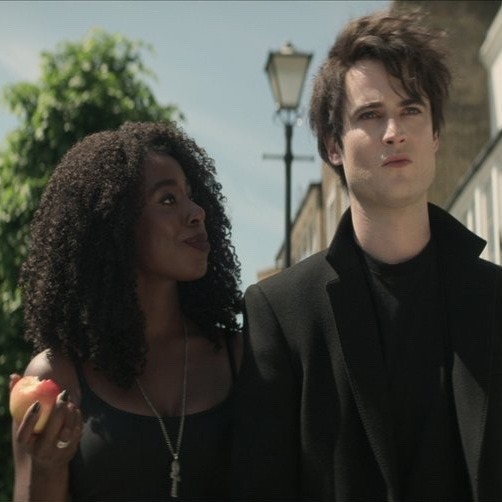
2. They get upset about gender swaps. "This character was originally a man!" I understand if you have a particular visual in your head of a character but if you think the interactions will drastically change meaning and feeling because the male character is now a woman perhaps you should consider your own bias on the subject. Or perhaps the original story was something of a sausage fest and even the author wanted to add more women to the mix.

Sometimes this is not actually a good thing. Changing Lestat's lover Antoine into Antoinette in the Interview with The vampire TV series bordered on straightwashing just to make his bisexuality more blatant. Also Lestat making her mutilate herself (cut off a finger) to fake her own death contradicted how Lestat acts with his lovers in the novels and was ultimately pointless since they kill pretty regularly and Lestat could have taken the finger from any woman's corpse. In the most recent remake of Children of the Corn they had the child preacher be a little girl instead of a boy. This attempt at inclusion undermined the patriarchal symbolism of a fanatical Christian-like cult and felt like another crude dig against matriarchal religions like the remake of The Wicker Man. So you see from my own examples sometimes there are understandable exceptions. But *In general* character gender swaps don't usually do any harm to the story. 3. They get upset because characters that were not confirmed as queer in the original stories are now openly queer. "But he was straight in the novels!" Not necessarily. Sometimes characters are queer coded or "overly straight" (compensating) to hide that the character is not straight to the casual observer. You have to consider that some novels written thirty or forty years ago had to contend with homophobic publishers.
Though Anne Rice's Vampire Chronicles seem pretty obvious to a lot of people and there are scenes of Armand actually calling Daniel his lover and Lestat asking Louis why he loves him, etc, there are still people out there convinced that Anne Rice's vampires are straight. I can still recall back in the 90s being an Anne Rice yahoo group and someone responding to a post with "My Prince Charming is STRAIGHT!!!" (this was in regard to Louis).

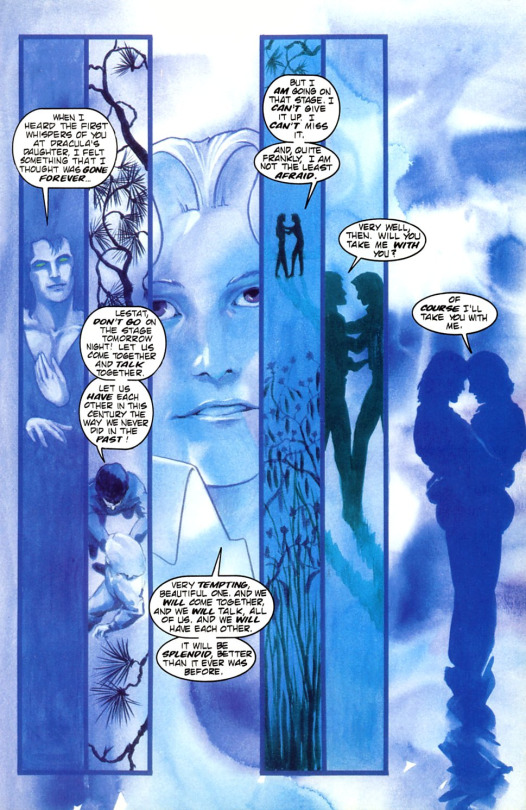
Now, today the flamboyant bard Jaskier (translated as Dandelion in the English language novels and directly translates to Buttercup) was confirmed as bisexual in The Witcher Netflix series. And there are "Purists" genuinely angry about this.
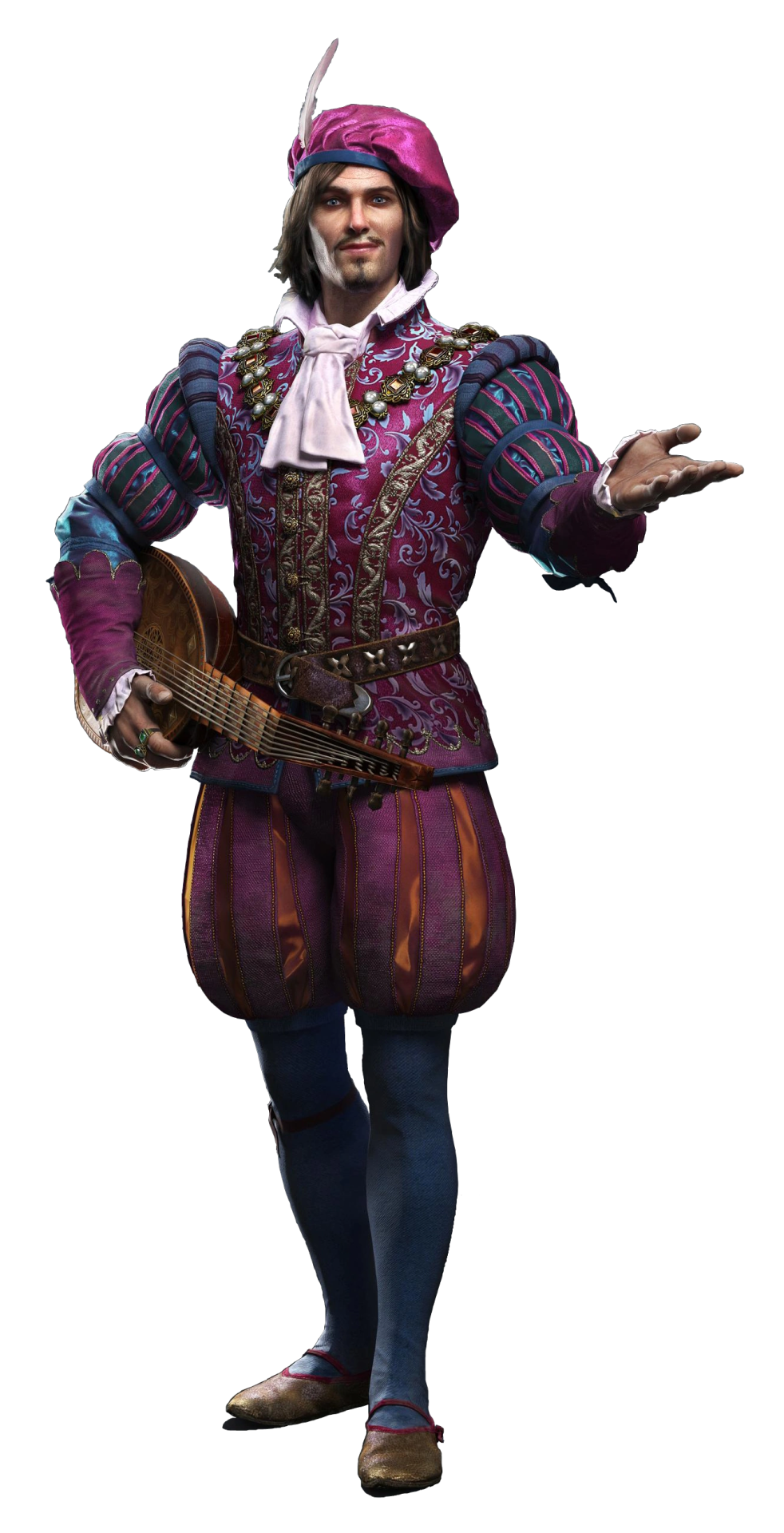
Their biggest shield of "We just want book accuracy" is the fact that there are scenes of him "womanizing" and being a promiscuous flirt with women but never men. So what? So what if The Witcher's sidekick is bisexual? If it supposedly shouldn't matter why are you upset? How does it harm the main story? One argument I was given is “It’s important that he look gay without being gay as to break the stereotype.” And yet others will claim there was never any hint that he wasn’t straight. Which is it? Is it he was a stereotypical queer man who was actually straight or there was supposedly no sign that he was ever queer. Make up your mind. Sometimes the LGBTQ+ content was always there such as in Neil Gaiman's The Sandman and the person who supposedly read it went into such a deep denial that they genuinely didn't see it when originally reading the story. 4. They get upset if an old bit of sexism in the original story is corrected. i.e. the occasional Witcher fan who insists (despite the video games) that Ciri can NEVER be a "real Witcher" because "only men can be Witchers." I once got into an argument with a Witcher fan who insisted that despite what the video games say, because she wasn't mutated and never went through the Trial of the Grasses, Ciri can never be a true Witcher. And it's "Important" that no woman ever be a Witcher. Really? Why is that so important to maintain?

Just because something always was a certain way doesn't necessarily mean it should remain that way. 5. They question if a character was changed when the character was actually always that way. This could be in regard to a character being gay or it could be in regard to a character being Jewish. I remember when the still from Coraline circulated with her celebrating Hannukah and people thought it was fan made because everyone was just so used to the default that all characters are presumed Christian until told otherwise.
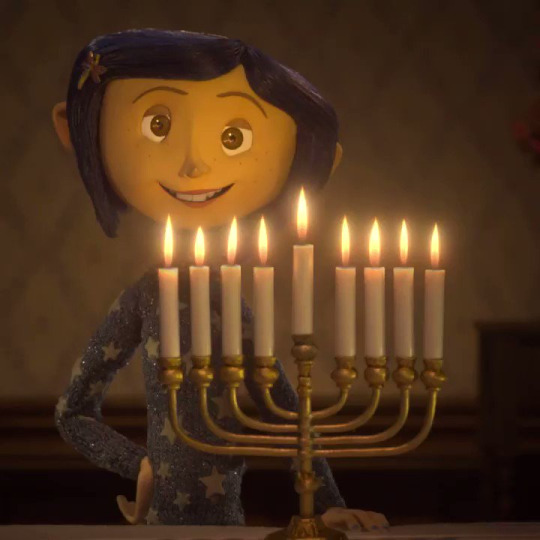
This sort of thing is common, taking for granted that a character is just like you or fits a “normalcy” unless explicitly told otherwise. This also accounts for a lot of characters being presumed straight until shown otherwise.
When I was watching Penny Dreadful there were people upset that Ethan was “made” gay (revealed as bisexual) in episode 4 of the first season “because there was no sign of it before. It’s set in 1891. How was he supposed to “act” bisexual? There were people in such denial that they convinced themselves that the man he slept with, Dorian Gray, had put him under some sort of spell. The irony is Ethan wasn’t even revealed as being a werewolf until the end of the season and his real name wasn’t given until season 2 but somehow him being bisexual and it being revealed in the fourth episode of the fifth season was “out of left field” and “made no sense.”
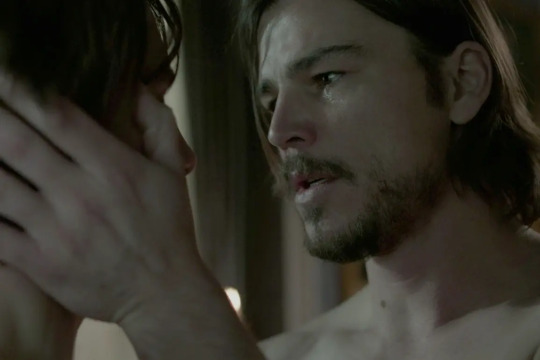
Imagine if Buffy The Vampire Slayer fans reacted to the reveal (that I predicted at age fifteen) that Angel is a vampire. They didn’t confirm that until the fifth episode of Buffy. 6. They seem okay with added domestic violence or sexual abuse (i.e. rape scenes) which would also contradict previous depictions of some characters' personalities but will complain if and implied gay character gets to kiss on camera or a woman character gets to do something assertive that she didn't do in the source material and does not contradict any character personality trait. 7. They will argue that something "Is not canon" unless the author put in the original story even if the author confirms it after the fact and can prove where they hinted at (though didn't confirm) the thing in the original content. i.e. J. K. Rowling confirming that Dumbledore is gay.
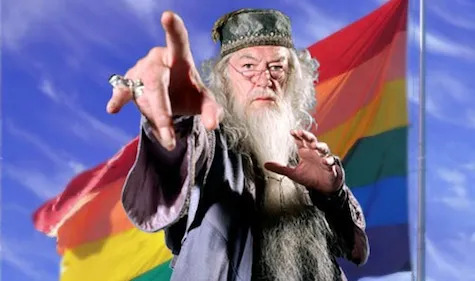
I understand LGBTQ+ people being angry at this (and far worse things J. K. Rowling has done...) because she should have been brave enough to address it in the story itself but I'm speaking of those that refuse to accept that Dumbledore is gay and will even argue that if they accept he's gay it means Voldemort is gay too and they're all suddenly ped0s. I kid you not, I had to remove someone who went on this very rant from my Sandman Facebook group. This is also true with the elderly lesbian couple in Coraline. There are people angry that Neil Gaiman didn't out-right call them a couple in the story even though there were several pretty blatant hints. But at least with that one there are less people insisting it's not really canon. Probably because they DO behave like an old Hollywood / Vaudeville gay couple.

8. They seem okay with added content that wasn't in the novel until or if a woman or minority gets to shine in the extra portion of story. This can be in regard to a passing-of-the-torch or just a scene that was not in the original books but added to enhance the original story. Somehow this might upset them greatly even if the added content dos not contradict any of the original books. It's just an added bit of story. The only reason I could think of to be upset at an added scene is if that scene suddenly and drastically contradicts the character's established personality. i.e. a scene of Morpheus in Neil Gaiman's The Sandman opening a dance club and favoring Gangsta rap. Thankfully this particular scenario does not exist. 9. They kind of accidentally out themselves as having not read the books that they claim they want to keep pure by whining about "woke" content that was IN the original story. i.e. Sandman fans surprised at all the LGBTQ+ characters. 10. They out themselves as having not watched the thing that they are complaining about. "I refuse to watch The Sandman because I heard that the only character Death is a black woman." Buddy, you misunderstood. The Grim Reaper is played by a black woman. There are lots of white people who die. Or "I don't understand The Witcher: Blood Origin. It doesn't make sense. Geralt wasn't born a Witcher. They're sterile!" Yes... They are. Do I need to explain the plot of the show you decided not to watch even though there are Wikias? It does tell a story that doesn't exist in the books but you seem to have leapt to conclusions by the name alone. These sort of Book Purists (Book Puritans) make me embarrassed for appreciating and wanting the integrity of characterization and story from the original books (in adaptations) kept in tact. It's reached a point where if I complain that Lestat shouldn't be physically abusive to Louis in Interview with The vampire (TV series) and they should never have added a random scene of Claudia being raped by a teenage vampire - someone else will give the kneejerk reaction "You just don't like it because Louis is black now!" Actually I think the Louis and Lestat actors are excellent. It's the writers and showrunner I don't like. I want to be able to explain the parts of the story and character I care about and want preserved without people assuming I'm doing a bigoted dog whistle because of this newer version of book purist. These book puritans are giving us actual book lovers a bad name. End of rant.
#Anne Rice#Andrzej Sapkowski#Neil Gaiman#The Vampire Chronicles#Vampire Chronicles#The Witcher#The Sandman#Mayfair Witches
39 notes
·
View notes
Note
I'm sorry if you've been asked this before but what are your thoughts about Arcane potentially being canon? I do not like it.
And if you don't mind answering another question, how do you feel about the way people sort of interpret Jayce and Viktor?
I don't think it's a good idea and it strips away many of the interesting things about these characters and the *universe's story as a whole* to exclusively represent the simplified, time-limited version of events that could fit the runtime of a TV show.
I've been asked this before and I always say this: Arcane is the MCU version of league lore; with the same strengths (improved visuals, the fast pacing of a cinematographic adaptation) and same biggest weaknesses (flimsy story summarizations that sacrifice a lot of the compelling narrative and kill entire characters)
I've been a comic fan for nearly as long as the MCU has been viral and I can tell you every attempt to retcon MCU events into the estabilished comic universe has not worked. It has the opposite effect of interrupting character arcs and stories people actually like and undoing pre-estabilished facts about the magic of the universe, driving away fans of the original medium while failing to attract the new movie/tv-show audience to check out the original, because those are completely different demographics.
It's even worse with Arcane, as we already KNOW one big joke in the fanbase is "even if you like the show, dont play the game. It's stupid bigoted redditor shit and it sucks" - there's an entire genre of arcane fan accounts who are militant about not playing the game and encourage others to never play the game. I don't think league's execs understand this, though, which is why we are seeing this current trend of a DRASTIC pullback in any and all lore-related content for league coming from higher-ups, and some of the old estabilished writers leaving the company while CEOs promise they're trying to find "an unified version of the narrative experience."
To stay on topic here and also answer your second question; ive rambled at length about jayce viktor interpretations in my meta tag. I reccomend you to look there! You'll notice i havent gone into specifics about what in arcane's narrative is weaker since its included on those.
I'd like to finish this post in another way though. In the long run, I don't think it matters that execs are trying to force narrative retcons despite the internal and external negative response to it. Fans will always like the specific thing they like, and in this scenario, start to define what versions of the universe/character they're talking about by release year or authorship, which is already happening in league. This is why the vikjayce codex exists and will not change, and this is why you see people using "2011/2016 lore" and "jayce giopara", etc.
Remember all these MCU retcons I mentioned? Whenever a movie is past its expiration date and the story element they tried to fit into original canon is considered a fad, it's just rewritten back to what it used to be. The newest marvel news this month is that CEOs decided to kill kamala khan ahead of her upcoming movie, as the MCU couldn't fit her signature elastigirl powers and they want to swap those out for the dumb purple magic the movies gave her instead. This will not last, as these never do. In 4 years she'll be back to normal, and in the meantime, elastigirl kamala will continue to exist in all her source books and videogames. The same way league's original bios are preserved and spin-off game content like the LOR comics or Convergence will continue to exist; I can't change any shortsighted decision from the CEOs, but fans as a whole have systems to define different universes and pick the version they like best.
Arcane has been called an AU by people who've worked in LoL's narrative, and is just the newest shiny thing. It is not "canon", as it never fit any part of the current game universe, and any future attempt to "make it canon" is just another permutation of an AU. I would encourage anyone who's nervous or anxious about retcons to not give a shit and disregard it altogether. If it doesn't work, you can always change it back.
28 notes
·
View notes
Text
Why I prefere 2023 Constance... and still like BBC Constance
Take in mind, I write this at a point where I have only watched BBC The Musketeers season 1 and The Three Musketeers 2023 - part 1
So I recently started watching a lot of different The Three Musketeers adaptations. And all of them have a really different approach on Constance. The one dimensional love interest to the Dinsney Princess. BBC The Musketeers and The Musketeers 2023 have choosen a way more interesting approach.
BBC The Musketeers has given Constance much more involvment in the story, changed her from "a love interested" into a woman with her own motivations, her own story, her own power.

The Three Musketeers 2023, stayed closer to the book but carefully updated Constance. 2023 is still a love interest, a damsal in distress.
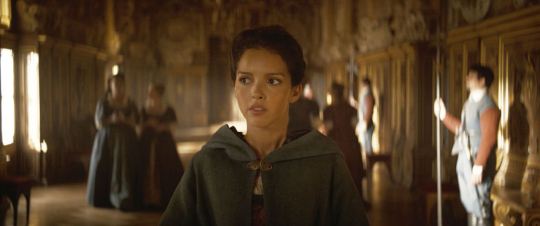
So why do I prefere 2023 Constance over BBC Constance?
1. In the book D'artagnan is horny for every decent looking woman who crosses his path. He often kisses them without permission (Constance) or their knowledge (Milady). And it mostly played as a joke. When women refuse him, he never accepts that. It is potrayed as "no means yes". Both BBC and 2023 updated that. In the 2023 movie it is really well shown how D'artagnan looses every braincell everytime Constance (or any other woman) enters the room (Not that he has any in the first place). When he is around Constance he comes closer to her, comes into her personal space, heavy flirts with her, is always around her. But he NEVER never ever kisses her. When they finally kiss it is Constance who makes the first moves. It is her decision, and the kiss is a 100% build on consent. In BBC they choose anotehr approach, that was really clever imo. D'artagnan kisses Constance without consent, to hide from the people behind him (a nice wink to the book). But then gets punshed by her. So far... i like it. Now comes the bit where i struggle. The scene quickly takes a drastic turn. Suddenly our hero trambles and falls. Constance is not only helping him, but also giving him a home. Which frames the scene as: "Its not okay to kiss a woman without her permission. But if you are meant to be together... its okay." Which is so wrong and weakens the previous statement of "don't kiss women without their permission!"
2. In the books Constances husband is a comic relief. He has no real story relevance, apart from one bit, but all in all he is just dumb and disgusting. So 2023 wasn't the first adaptation to get rid of him. He was allready erased in the 2011 movie. It simplifies the story a lot and also takes away the "Constance is a cheater"-narrative. Which in the book is potrayed: "Its okay thing to do, because he is old and disgusting and dumb af. He is basically begging his wife to cheat on him." With erasing him in the 2023 movie it also gives Constance more autonomy over her own life. Makes her more independent. Which is really cool, because she makes her living on her own. In the BBC show I struggle a lot with her husband. Because he isn't an asshole, he isn't old and he isn't super dumb. He is just... there. Or most of the time, he isn't actually. He only appears to pepper in drama in the Constance/D'artagnan relationship, and is then painted as the asshole. That is weak writting imo. They can have sex in his house but then he has to magically re-appear to ruin the relationship? Come on. I think his character could have worked if they worked with him more.
3. I can understand that the BBC show wanted to have more female power among the main cast. Which is totally understandable, considering the book is completly centered around white male cis characters. The BBC made sure that half of the main cast are people of color, making sure there is a certian kind of diversity (not queer sadly). But I don't think giving a woman a gun and a sword is necessarily the definition of "empowerment". Constance being able to fight is cool, but giving her a gun and a sword isn’t "upgrading" her from a simple love interest into a powerful character. Especially when the narrative is not supporting it. On the one hand you have Constance being all bamf, but on the other hand she is introduced by inviting the guy who assaulted her into her house (D'artagnan), is then staging as a prostitute and a wet nurse. Also, so far, in season 1, she has fought with a sword once and shot a gun twice. Mostly she is reduced to a love interest. Imo the show hasn't found a good balance between "this woman is empowered because she knows how to fight" and "she is still a sexy love interest". Maybe that will change in the coming seasons, but why can't Constance stage as a horse driver or a guard or idk. Something that is not limited to her gender.
This is why I like the 2023 movie approach more. Where Constance is doing the laundry for a living but also serving the queen, acting as kind of a spy when needed. And she is good at that. She manages to do these two things simultaneously and often saves the day with her spy skills. She is still reduced to a love interest eventually of course but the show has the "she is a spy"-narrative right there (because it is already in the book) and doesn't make any use of it. Thats so confusing imo. Because it would have suited the time the show plays in her so much more, then: she can swordfight" and maybe even contributed more the story.
4. As already pointed out in point 3 BBC Constance is eventually often reduced to traditional female roles and wishes. The end of ep 7 wasn’t a big „ah she can fight so well with the sword“ but „she wants a baby from D’Artagnan“.
TL.DR: BBC Constance often feels like they wanted to show her all empowered but eventually still not knowing what to do with her character. So they gave her classic female roles again. It feels like the show is running from end end of the spectrum to the other and there is nothing in between. I really like her, I just see so much missed opportunities when I look at her character.
#the three musketeers#constance bonacieux#the musketeers#bbc the musketeers#the three musketeers 2023
10 notes
·
View notes
Note
haven’t read outlander! is it good? talk about your favorite books now though, i’d love to hear them :)
I don't know, people have very different opinions on outlander. I think Outlander is good for what it is: a detailed, dense elevation of the harlequin genre with engaging supporting characters and a good use of tropes. It's not technically a harlequin novel, but the love story kinda fits and the protagonist puts most fictional romance heros to shame (he's brooding and funny!). I like the first three books, the fourth one is okay and she really should have gone with the good open ending she had there, afterwards it really went off the rails and I quit because it became too insane. There's only so much time travel hijinks I could take. The author's persona also was kinda off putting. Her opinion on fanfic is not positive lol. The show is different, and the plot changes drastically after season one, but good from what I've seen.
My favorite books…
So many, nonnie, and I could write essays about them which will bore people to death, but I will say that Michael Ende is my favorite writer and the Neverending Story my favorite book and I need everyone who has seen the movie to understand that that is an absolutely failed film adaptation. The makers of the movie did not understand the core message of self-determination, responsibility and finding yourself of the book and ruined the leitmotif for a cheep scene at the end of the movie, nevermind all the things they missed in between. The movie itself as a fantasy movie for kids probably is okay, but it has as much to do with the essence of the book as strawberry pop tarts with actual strawberries. And the reason I talk about the movie is because not a lot of people outside of Germany have read thet book whereas the movie unfortunately spread widely 😅
I can also only recommend Momo which is still, despite being fifty years old, an extremely topical story about the value of time, losing focus on friends and family to become cogs in the soul sucking, exploitative, meaninglessly consumerist machine of capitalism without really understanding why, working for nebulous, unattainable goals for a shadowy elite that will literally steal and corrupt your life force to feed themselves. I know it sounds dark, but it is a lovely story about friendship and kindness and it has a great grumpy turtle with a heart of gold.
#anon ask#I don't think this is the kind of post people come here for so I'm keeping it short#book recs#kinda anyway
2 notes
·
View notes
Text
I’m thinking of Ending Things (Movie), Faithful to a Fault.
Spoilers following for the book ‘I’m thinking of ending things’ and the movie adaptation.
I’m thinking of Ending Things is a good adaptation but as a self contained movie it is adequate but missing. As someone who has not read the book I will discuss my issues with the movie as a self contained story. As someone who is going to get the book and read it I will discuss the differences in more depth some other times. Probably. Below the cut are the three prevalent issues I found in the movie.
The story follows a young woman (typically called Lucy) and her boyfriend Jake. Throughout the story you learn that Lucy is a fictional woman created to comfort a lonely old man Jake- one at which he feels guilty over utilising consider she is a real person he saw once. This leads to the story.
First- not an issue but some background information which will provide insight later on for why I consider these issues rather than simple adaptation errors. The movie strays far from the book given it’s form as a visual medium, this appears in several parts but notably Kaufman includes alternating shots of the old man Jake and the fantasy world- an element not included at all in the book as it’s all told from the woman’s perspective in first person with it only being revealed in the end as a twist. Kaufman utilises the visual medium to include a ballet dance number to Oklahoma as well as a song that does not appear in the book. Including whole new scenes is not the the only major difference he made, additionally in the scenes with the parents he takes larger steps to make the twist more obvious, characters changing ages rather than just changing dresses and bandages. This leads heavier into the themes of death, age, decay that do appear in the book but nowhere near the level portrayed in the movie.
As one reviewer put it ‘the only literature you really need to know before watching the movie is the original novel’- which, is painfully accurate. The movie has three parts that really stick out considering the framing. In a scene where the two characters buy milkshakes a woman tells her ‘sorry about the smell, we’re varnishing in the back’, which she then says ‘I lied we aren’t varnishing’. If the second line didn’t occur it would be easy enough to overlook- but with the emphasis on it the fact that the movie never mentions the varnishing or even states the man is inhaling the fumes in the real world it feels drastic, considering the movie shows us the real world throughout, including a flash to him being a peeking Tom when he tries to kiss Lucy. In the book the line directly links back to him cleaning with the varnish without proper ventilation. Considering Kaufman chose to change so much of it in the two hour movie but include that line makes it so much more of a glaring oversight.
Another issue with the movie is the Caller, in the book it is first mentioned in page 6, in the movie it is mentioned about half way through, focused on twice and abandoned without consideration or follow through. This element is another oversight- to include the caller as a hint of the fantasy without engaging with it in any meaningful way leaves it unfulfilling.
Finally- in the book the minor changes in Jakes parents are easy to overlook. Far easier than changing ages or moving from their deathbed to being cheerful young parents, as such when Lucy sees a picture on the wall of a child (that Jake claims to be himself) and her internal monologue states that the child in the picture is her it feels like a big moment in the book, and her finding it unusual is a human reaction that makes perfect sense. It feels right. In the movie however the changes are all incredibly large; whole scene and character shifts- ages, characters developing dementia and being so young and spry, this is never mentioned. Lucy does not mention it in her internal dialogue- she pauses at changes to puzzle over it but it’s moved passed so quickly. So why then does she pause over her picture? Why is her picture there? Lucy is a figment, he feels guilt over fantasising about her without knowing her past or future- without even knowing her name- and yet in that scene he gives her a past in the form of a picture and she acknowledges that.
Someone out there may have a wonderful answer that encapsulates it all but as a movie watcher I had to keep looking up references and finding the answer being 'in the book' felt like a gut punch. To include references to the book is one thing, to include lines from the book that reference things not in the movie is frustrating.
0 notes
Text
In Muppets Wizard of Oz's defense, it finds itself in the very unfortunate position that a lot of modern Oz adaptations are in; namely that mainstream audiences are significantly more aware of the MGM Oz movie than the original L. Frank Baum book.
It's incredibly clear that the people working on the movie wanted it to be a faithful to the original book and its sequels; they incorporate minor details such as the Good Witch of the North's real name being Tattypoo (the name she's given in Ruth Plumly Thompson's continuation of the series), they rip lines straight from the book at points (the "bran new brain" line, for instance), and while occasionally they alter certain events (Tin Thing and Camilla reuniting as a couple while their book counterparts don't get back together, for instance), for the most part it's an accurate adaptation of the books - in fact, I'd argue it's the most accurate book!Oz adaptation I've ever seen.
However, the average person's mental image of The Wizard of Oz isn't based off of the books, it's based off of the movie, which had to make significant alterations to the original story in order for it to work as a film aimed at a Depression-era audience. Most notably, it drastically altered the more fantastical elements because fantasy films were doing poorly at the time and the studio thought audiences were too sophisticated for a straight fantasy film - whereas in the books Oz is a real place that Dorothy goes back to numerous times (and eventually moves to with her aunt and uncle!), in the movie Oz is just a dream Dorothy has, with the people who live there being dream logic versions of people she actually knows.
Obviously, the fact that the version of the story best known to an average moviegoer is a version DRASTICALLY different from the original novel is an issue when one is adapting the original novel, so said adaptations usually keep in one or two details from the movie to make things more palatable for mainstream audiences - and since the Ruby Slippers are owned by MGM and apparently cost a pretty penny to buy the rights for, typically they'll keep the "characters in Kansas look like characters in Oz" aspect.
1985's Return To Oz is a good example of the "characters in Kansas look like characters in Oz" detail working, as it purposefully uses said detail as part of the narrative (the characters in Kansas who look like the characters in Oz are the characters in Oz, or at least supernatural projections of them), but Muppets Wizard of Oz doesn't have that detail in the narrative - in fact, given how I found this Variety article lamenting that the film was going to be book-only, it's likely they added in this detail last minute to appease audiences without thinking how it would affect the narrative at all!

So yeah, it doesn't make sense and is definitely one of the parts of the movie that's bad-bad instead of funny-bad, but that's because it's a) most likely part of an attempt to make the story more palatable to non-book!Oz fans, and b) possibly a late addition given feedback from the people it needed to be made palatable for!
so muppets wizard of oz isnt that good right?
most of the stuff that's objectively not good about is pretty funny in it's bad-ness, but theres just this one this that annoys me to no end about it. and that's the fact that it combines fact and fiction, for lack of a better term.
it's the fact that, according to the context of the movie, everything that happened in oz actually happened in real life (instead of in a dream sequence, like in the original), as well as the fact that the muppets exist in BOTH the "real world" and in oz. specifically since the muppets exist as the muppets. like. the muppets.
most muppet movies fall into either two categories: a) the muppets as actors in the movie playing different characters or b) the muppets as themselves. muppets wizard of oz does both.
in the beginning of the movie Dorothy's trying to get an audition with The Muppets ™️ to sing with them. then, when she's in oz all of the characters in there are played by various muppets. now, this on it's own, is not that bad, because dorothy could've just been dreaming out the muppets because of her recent encounter with them.
but oz actually exists in the movie and dorothy actually went there. when she comes home she floats down into the street or something, still in her emerald city glow up outfit, and her aunt and uncle say that she's been missing. because she was actually in oz.
and that means that the muppets exist both as themselves but also as different people in oz? which just doesn't make sense. kermit cannot exist as himself, the lovely frog in charge of that weird group of fleece creatures, and also as a scarecrow frog thing. that doesn't work
anyway. i think despite all of the things weird about that movie, this is what i hate most. if youre going to give gonzo nipples, at least have the movie make sense
[all of this is /pos btw, this movie is bad in a hilarious kind of way]
#sorry if this came across as rambly or annoying lol the oz books and the muppets are just two of my favorite things#and I will take any opportunity to talk about them in tandem :)
23 notes
·
View notes
Text
Anyway with Young Justice forcing itself down my throat any time I go into the Cass tag now, it's time to talk comic book adaptations.
Obviously, the primary objective of any adaptation should be to create a story on its own merits. This is especially true for comic book adaptations, which usually are less straight adaptations of a storyline, and more a case of creators taking characters and settings and doing their own thing with them. 'This thing is different than it was in the source material' is not, in and of itself, meaningful or useful critique towards an adaptation. You can be upset at changes or dislike them, but that doesn't make them inherently bad, or make pointing them out good critique.
That said, when adaptations take characters and completely destroy the core of who they are in the source material, fans absolutely have the right to point out how this is a bad adaptation of a character. If you are adapting something, comparisons to the source material will be made, and critiquing something as an adaptation is different from critiquing it as a piece of media. For example, due to massive changes in design and personality, 2003 cartoon Starfire is practically unrecognizeable as a version of Koriand'r from the comics. This does not make 03 Starfire a bad character, but it does make her a bad adaptation, and critiquing her as such is fair game.
And there are also cases where changes in an adaptation are simply for the worst. In these cases, changes made to a character actively rob a character from agency, narrative importance, depth, or other vital elements and/or add racist/sexist/ableist/etc elements that weren't present in the original/amplify those elements if they were already present. While a character may still be fine if you view the adaptation in isolation, if viewed in tandem with their source material, it becomes clear that the changes actively weakened the adaptation's narrative (at least of that character, if not the whole story).
For example, the way Cassandra Cain's character was rewritten in the Birds of Prey movie made her an objectively weaker character, with a narrative reliance on a white woman, Harley Quinn, less backstory, less character depth and development, etc. than she was in the comics. This makes her not just a bad adaptation, but a worse character than she was in the comics. Arguably, it also made the movie less interesting, since its themes of vengeance, changing as people, and escaping controlling/abusive pasts are all stuff that Cass in the comic is either intrinsically intertwined with, or has dealt with a lot. This would make a more comic-accurate Cass a more thematically interesting fit for the movie. The adaptational changes, in this case, affect a narrative for the worse.
Furthermore, it is possible to change a character drastically in adaptation, while maintaining the core of a character. For example, Barbara Gordon in The Oracle Code is radically changed compared to her main comic continuity counterpart: a teenager instead of an adult, a different backstory, not a superhero, with less of a focus on technological prowess or behind-the-scenes masterminding. In addition, almost none of the story, setting, and side characters are based in main comic canon. However, if you compare Barbara's journey in The Oracle Code with that of Oracle: Year One (in Batman Chronicles), you'll find that, despite the stories having no resemblance, their thematic cores are the same. They are about Barbara coming to terms with how her life has been changed, due to an event that wasn't even about her, learning to not just cope with but find happiness in her new disability, all the while learning she can still save and help others and thus taking her life back and reinventing herself. Adaptational changes, even severe ones, do not have to come at the cost of sacrificing the original themes and core of a character, and when this does happen, people have a right to critique it.
194 notes
·
View notes
Note
Just to address the time period of interview! Since Louis was cast as a black man it was changed partially accommodate that aspect of the story. The writers didn’t want to tell a slave tale and I can’t exactly blame them there. Personally, I think the new show really tells a compelling and interesting story with a LOT of grace, skill and nuance. But it’s very very different from the book so if you’re looking for a one-for-one copy you’ll be disappointed and this definitely won’t be for you. Anne Rice did have a hand in the production though before her passing so a lot of these changes have her blessing!
i did do a little searching to see why! i've actually been following the show's trajectory for a long time (we were SO close to a bryan fuller helmed the vampire chronicles series, can you IMAGINE), but i kind of fell by the wayside after anne rice's death. i know her son is SUPER involved, though!
(cw: spoilers if u havent read tvc and intend to, talk of things that happen in series including rape and incest, purity culture fandom stuff).
i am not generally a 'this adaptation has to be incredibly accurate to the book or it sucks' type person , but for me the time period is so inextricrably linked to the characterisation of the series that so much change feels like an almost entirely different plot! in the early 1900s, by the time claudia and louis have pulled off their attempt to kill lestat some 40+ years later after they've existed as a family unit, surely the sea voyage they undertake is a Very Different Beast! it looks like lestat's birth date stays the same, so the whole subplot of him bringing his dying father to live with louis is basically gone too (and lestat is an anti-hero, certainly (and the villain in interview, in as far as we can trust louis as a narrator) which i think definitely removes some humanity and sympathy from lestat. lestat has got to be over 100 years old by the time this interview takes place, which is . . . oof lestat, you never learn do you. idiot [affectionate].
i hope it does well, if only because the vampire lestat is my favourite book in the whole series and nicolas (lestat's first love, and the reason he's originally attracted to louis at all - because louis reminds him of him) is one of my favourite characters of all time (as is gabrielle, lestat's mother), and so far the only adaptation that has them both done well is the musical and i want to see them in a mainstream adaptation that doesnt flop horribly!!! i'm just sad anon fgbkjngkfjn. and also because of the beautiful costume porn i'm missing out on. some of the claudia costumes i've seen production shots of hurt me in my Soul.
also (this one is solely on me), i've already seen people doing things like running zines that have a wholly uncomfortable purity culture fandom thing going on. and tvc is NOT a series conducive to that mindset. lestat is in a bizarre incestuous kind of relationship with gabrielle, his mother (and with this adaptation out and out saying 'vampires can have sex', really interested to see how that's handled). lestat is canonically a rapist (and yeah even after that we are still to love and adore him for more and more books). armand's backstory is . . . whoo. the vampire chronicles is hardly a Niche Interest, but i can already foresee a lot of discomfort if indeed the show does well enough to get as far as books like body thief!
but mostly the vampire chronicles means a lot to me (it's the reason i decided to go into musical theatre, and i'd never have made most decisions in my life without reading it), so such a drastic change makes me feel a little sad! i will get over it fgbnkjjngf. just taking a moment to mourn! the movie still remains beautifully costumed and imo one of the best book-to-movie adaptations made, despite the changes it made (rip louis' brother, didnt make it to the big screen), at least!
and, ofc, we always have lestat the musical.
7 notes
·
View notes
Note
let's say you've been put in charge of a new thg adaptation, whether it's a new film series, a miniseries, or a tv show. you get complete creative control. what's one scene you would definitely make sure to include that did not make it into the movies? @anonymousinpanem
if I had complete creative control.... what a dream.
okay so,
id want to include the heavier topics for sure because whilst the movies clearly condemned the games, they never really did so for other things that are condemned in the books such as the treatment of the tribute as sex slaves. it's a great disservice to everything that the books handle and i would hate to make something which glossed over the same problems again. for example, i probably wouldn't use finnick talking about his abuse as the background audio when the d13 soldiers reduce the tributes in MJ. id make it the focal point of a scene so that the audience could focus on it properly.
i'd do age accurate casting so the audience wouldn't be able to miss the fact that the tributes are children. in the movies, most of the unnamed tributes are kids but katniss and peeta and cato should have been too. they're only like 16 in book one and depicting that accurately would have made the story hit home more imo. these are kids that are being made to fight in a death tournament.
i would have a lot more racial diversity in the cast instead of creating a world in which characters of colour exist only to die as martyrs or to further the plot and Katniss’s character development (Rue, Thresh, Cinna, Boggs). idk if this even makes sense, but Panem wouldn't be a world in which white people rebel against the establishment and BIPOC are either killed or depicted as failing in revolt. it wouldn't be post-racial. it would be a diverse country in which anyone can revolt, love, fight, and survive. the movies took away the chance for millions of non-white teenagers to see themselves at the forefront of a revolution, fighting for justice and im going to die mad about it so yep :')
i'd cast actors of colour in the roles of gale, katniss, haymitch and id cast a mixed race actress to play prim too! id dedicate more time to showing how drastically different the merchant class and the seam are instead of portraying d12 as culturally and racially homogenous. (i'd also include madge in it, i cant for the life of me understand why they cut her out)
in regards to the capitol, id paint it as grotesquely as possible; their overconsumption of resources, their facetious treatment of the games and the tributes, their total control over the districts etc etc - id try to denounce the capitol as much as possible in order to highlight its parallels with the global north. i think the movies shied away from things like this and, as a result, created a world which the audience could just view as completely separate rather than making something which clearly mirrors the present day
also! i would include the fact that peeta's leg was amputated below the knee and he has a prosthetic. the way the movies ignored this has always pissed me off and idk why they shied away from it honestly, so yeah i would include that definitely!
im rapidly running out of things to say so I'll end it here, I hope that's okay!
3 notes
·
View notes
Text
Jan/Feb 2021 Picks
HELLO! It’s been a while, but I’M BACK!! Life has gotten a lot busier as I started Grad School this January. So, I feel it may be tough being on time with future Monthly Wraps like I’ve done in the past with working on my MFA, and my job. I’m going to probably do more seasonal wrap ups when I get the time. I also think I’ll be posting more individual posts as I watch an episode. Because even with a busier schedule, there is always time for TV and there’s so much I want to talk about!
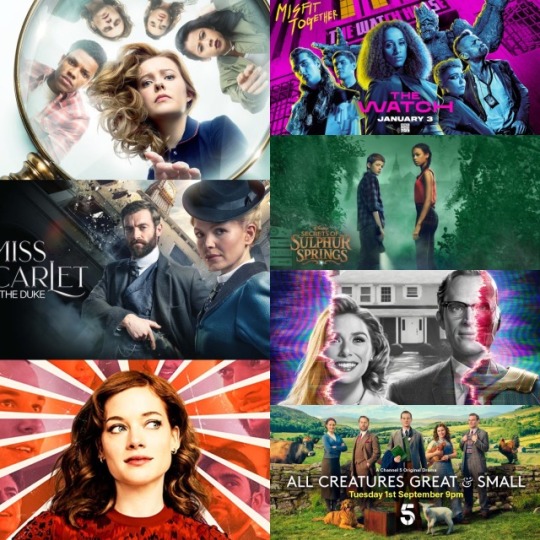
You know the drill. Spoilers are coming.....
You’ve been warned :)
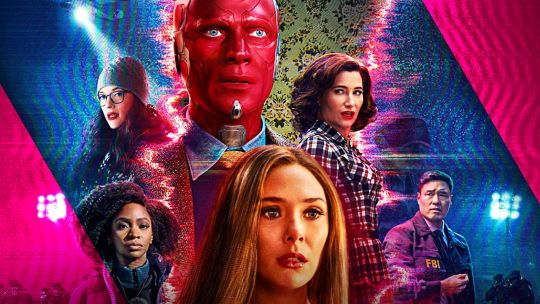
WANDAVISION
I want to start off by mentioning that I have not watched this week’s episode yet. So the last one I saw was EPISODE 6 with Halloween in the late 90s/early 2000s.
THIS SHOW! OMG.
I didn’t know what I was signing up for when I watched the first episode and I have been blown away. It is such a cool concept and I love the fact that everyone who watches it is confused. There have been so many interesting theories out there and I am so curious what is going to wind up being true. I love all the nods to old sitcoms and TV shows as well as all the MCU Easter Eggs. (I mean they got X-men’s Quicksilver-like WOW.) It feels really Black Mirror at times with the breaking of the fourth wall. I will never be able to shake the feeling I got in Episode 3, when Vision reversed. (And then I saw a bunch of videos with him looking at the camera as Wanda looks at the TV. Eww I don’t like it, but it’s such a good move on their point.) I love the outside plot as well and the characters who were previously side characters in other MARVEL movies. The love for Jimmy Woo is astounding and I’m here for it. I’m glad it’s Friday, so I can watch the next episode. I’m just upset that we’re so close to the show ending. The next Disney Plus Marvel shows better be just as good. Wandavision set the bar high.
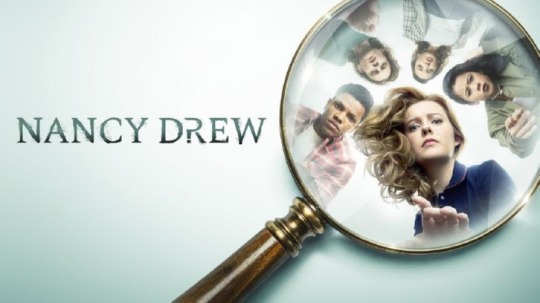
NANCY DREW
If you’ve visited this page recently, you know I have a very strong love for this show. It is the only one I am still watching religiously on the CW and I am tuning in the night it airs. (That is HUGE for me.) IT IS JUST SO GOOD AND I DON’T KNOW WHERE TO START....
2x05 just aired, which would have been the season 1 finale before COVID and I have it saved on my DVR to watch again. There’s just so much I want to relive and catch that I missed the first watch through. It would have been SUCH A GOOD FINALE, but I’m happy that we can continue with new episodes starting next week. And with the way it ended...there’s so much I need to know!! I’m just curious how fast they’re going to develop certain plots. I love the Drew Crew and how they are a family. Each character is so well developed and their chemistry is great. I love learning more about each of them and watching them develop. My favorite character is definitely Ace. I love all his witty lines and how he is opening up more to the group as well as to us, the audience, as we get more of a look into his personal life. I enjoy all of his scenes with his dad and specifically liked when they were celebrating Shabbat. (I am also here for the Nancy and Ace content. I gush more about this on my other blog: lydia-whogowith-stiles. Check it out if you want to hear more.)
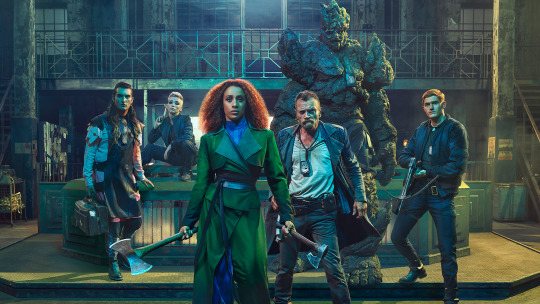
THE WATCH
When I watched the Christmas special (or was it New Years? and why does that feel so long ago) of Doctor Who, BBC America kept advertising a new show called the Watch. Due to the extensive amount of commercials, I decided to tape the first two episodes (which premiered back to back) to see what it was all about. I was unaware that this series is based on the book series created by Terry Pratchett. When I came to see if people were talking about it on Tumblr, I saw that a lot of people didn’t like it because of how drastically different it was. As I was unfamiliar with the original, I can’t compare. The TV show was eight episodes and I just watched the last one that aired this past Sunday. I definitely liked the first half of the season more (I noticed my mind start to drift as I watched later ones), but thought the finale was good. I really enjoyed how they incorporated the theme song. I didn’t realize the connection earlier and now can’t stop humming it. (I don’t know if there will be another season or not.) I enjoyed the characters and how it was like nothing I’ve seen on TV before. It got me thinking a lot about blending genres. I would still recommend checking it out.
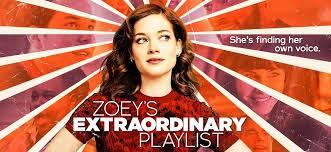
ZOEY’S EXTRORDINARY PLAYLIST
I was VERY excited for this show to come back. I loved the first season so much. It’s just such a heartfelt show and it helped me survive the early parts of quarantine. So far, this season I am noticing how detailed the musical performances are. Mandy Moore is doing an AMAZING job. The choreography is *chefs kiss* I also feel like the song choices have been great and not always the ones I think that would be picked. We are getting to learn more about each character and watch Zoey and her family as they continue life after losing Mitch. I am here for Mo and Max’s restaurant. I think the concept would be so cool in real life. Who knows maybe we’ll see one now. (Max’s rendition of ‘Numb’ was amazing. I’ve never heard the song like that and I think it might be one of my favorites of the season so far.) I hope Max and Zoey get back together by the end of the season. It did feel fast, so I do understand why they had to break up, but it still makes me sad that we watched them get together and then it was taken away from us. The last episode before the break was so powerful and I think the show did an amazing job applying real world issues into their plot. It did not feel forced at all and brought so much awareness. Upset we have to wait so long for a new episode.
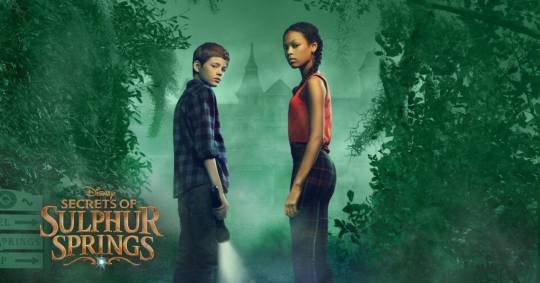
SECRETS OF SULPHUR SPRINGS
Are you looking for a good mystery, but don’t think Disney Channel can provide it? Think again. I have to say, when I started watching I was not expecting this show to be a part of my monthly picks. It pleasantly surprised me. The show involves the mystery of a young girl, Savannah, who went mysteriously missing at camp back in the 90s. Apparently, her ghost still haunts the hotel that was on the camp grounds to this day. Then Griffin and his family buy the hotel with intent of fixing it up and reopening it after all these years. The people in the town think they’re crazy because of its past. But there’s something more going on with Griffin’s dad as well as some of the other adults in the town. They know something about Savannah’s disappearance, but aren’t saying anything about it. While this is a kid’s show (and only half hour episodes) it has been interesting to see where the story will go. I’m sure I am imagining much more intense things for her disappearance than what actually happened. It’s also not super cheesy or have bad acting, which is refreshing. (I really feel Disney Channel has gone down.) Either way, I don’t know how many episodes are left to air, but I think we’re pretty close to the end. If you’re looking for a quick, entertaining mystery I would highly recommend.
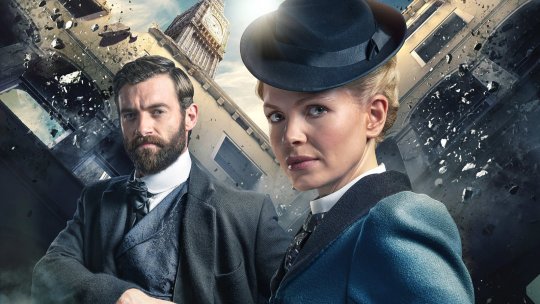
MISS SCARLET AND THE DUKE
And here come my period pieces (ironically both from Masterpiece/PBS this time). I know last year I felt like I watched a lot of historical watches at the beginning of the year. We’ll see if that continues to happen this year too. It does serve as a nice escape. Plus, these are some really good stories.
Miss Scarlet and the Duke is a part of Masterpiece Mystery on PBS, although it aired on a different network in the UK. It is (another) mystery series (shocking I know with that title!) It follows Eliza Scarlet who has a nose for mystery, but as a woman living in the Victorian era does not have any rights except for being a wife and mother (two things she would rather not be). When her father dies (apparently from a heart attack...emphasis on apparently), she takes over his Private Investigator business. Much to the dismay of long time family friend William “The Duke” who is a Detective Inspector for Scotland Yard. Eliza is often in his office as she gets arrested for being places she shouldn’t or trying to get information out of him. This element of Eliza having to work in a very male dominated Victorian society is one that I feel I haven’t really seen on a TV show. I really like her dynamic with William. There’s always that feeling of “will they won’t they,” but I don’t feel the show just focuses on that. The mystery is the heart of it all. This last week’s episode was REALLY GOOD. As we got to find out more regarding her father’s death. I hear a lot of people want a season 2 and I am right there with them. This show deserves it.
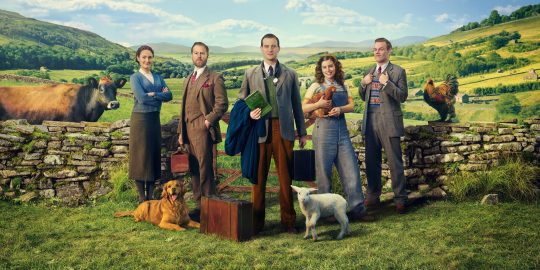
ALL CREATURES GREAT AND SMALL
Another PBS Masterpiece watch. I love this show, so much more than I was anticipating. It is so heartfelt and makes me so happy and in a good mood after watching it. It follows James Herriot who has recently graduated from veterinary school, but is struggling finding a job. Then he gets a call from Siegfried Farnon’s veterinary practice in Yorkshire. Siegfried is known for having a harsh demeanor and temper, so the assistants he hires don’t often last long. Spoiler alert, that should be pretty obvious, James does. The cast of characters are so lovely and I like all their relationships with one another. The show takes places in the 1930s and I realized I don’t often watch things in this era, so that has been fun to explore. The sets and locations are BEAUTIFUL. In the episodes, we often get these amazing shots that sweep over the exterior and I want to travel to Yorkshire like tomorrow. (See more escapism, it’s great.) The main plot follows everyone interact in the town and watching James become a more confident and experienced veterinarian (which I decided I could never do after watching). I heard that it has been renewed for a second season so that is so fantastic.
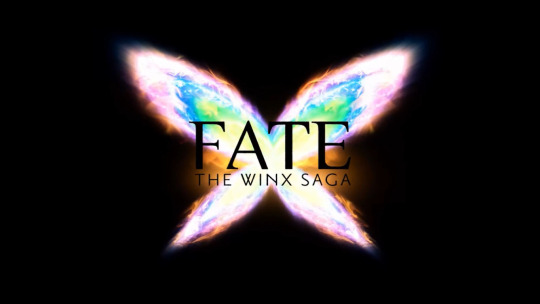
FATE: THE WINX SAGA
The first things I heard about this show was how disappointed everyone was in how they decided to adapt the Winx Club show from their childhood. On this I can agree, but I decided to watch the show anyway. I pretended that it was something new entirely and I have to say I enjoyed it. Of course, there were parts that bothered me and then I had to remember it was a teen show, so angst would be annoying. I think overall it was too short (and should have at least 8 or 10 episodes), but I’m happy that they were able to conclude the main plot well. (Although we did get that cliffhanger, but it is exciting that it was released the show just got renewed for a second season the other day.) I really liked Silva-mainly because it was great seeing Thomas from Downton Abbey in something else. I also enjoyed seeing Jacob Duchman in more things. It was a surprise to see him in Medici and I am just happy he is adding more to his IMDB.

Quick and addicting watch. Add it to your queue. Just forget it’s supposed to be based on something else.
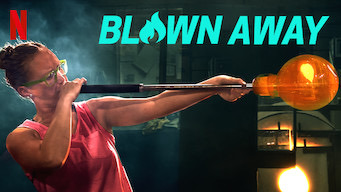
BLOWN AWAY SEASON 2
Continuing with the Netflix picks, one of my FAVORITE picks from 2020 got a season 2 and it is already on Netflix! That’s right Blown Away season 2 is now available. I seriously loved the first season of this show SO MUCH! Glass blowing is such a magical process and I am mesmerized every time I watch it. It felt weird starting this show with all new contestants, but then Alex came back as a guest judge and I was so happy. It is just as addicting and I cannot wait to see who wins this season. I am just trying not to rush the episodes.

VIOLETTA SEASON 3 UPDATE
I know you were all dying to know...
After taking a hiatus from watching during the holidays, I have gotten back into watching the Disney Channel telenovela on Disney Plus. I am now on episode 68. Things are really starting to happen and I am finding myself getting sucked in again, which makes me happy. Episode 60 (pictured above) had A LOT happen and really was a turning point for the second half of the show. Can’t wait to keep watching. Some really awesome songs from these last set of episodes.
AND NOW FOR MY NOT LOVING IT PICK:
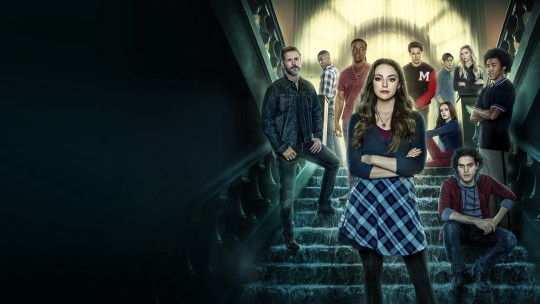
LEGACIES
This third season has really disappointed me so far. As I’ve previously discussed on this page, it feels like they are just reusing previous plots from the last two seasons when there is so much more they can do. There was so much promise for this show and I loved the Vampire Diaries and Originals so much, that it’s sad to see Legacies miss the mark. I wish they gave Hope more storylines that didn’t revolve around Landon. She is such a strong character and is SO POWERFUL. This is something we rarely see and it shouldn’t only be shown to save a guy (multiple times). Their couple plot is continually doing the same thing. I want to see a lot more development with this show over this season to keep me watching. I am actually happy that there isn’t a new episode until March 11th. (That’s saying something...)
#tv shows#TV Show Reviews#wandavision#wanda maximoff#jimmy woo#Nancy Drew#nancy drew cw#drew crew#ace#the watch#bbc america the watch#zoey's extraordinary playlist#team max#secrets of sulphur springs#miss scarlet and the duke#eliza x william#all creatures great and small#james herriot#fate the winx saga#jacob duchman#blown away#violetta#Legacies#hope mikaelson
48 notes
·
View notes
Text
“E” as in Eurus, Enola and Estate
In June this year the Conan Doyle Estate Ltd filed a lawsuit against an impending Holmes adaptation movie on Netflix (article from RadioTimes here: X).
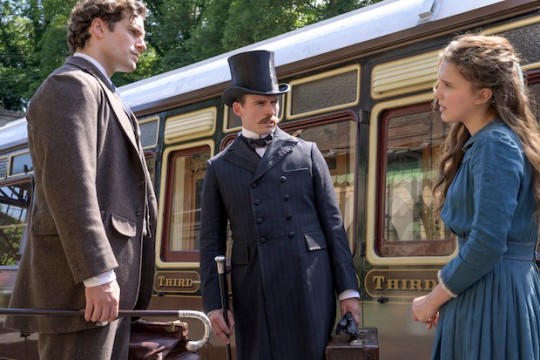
Sherlock, Mycroft and Enola, starring Henry Cavill, Sam Claflin and Millie Bobby Brown.
This post about it by @tendergingergirl (X) seems to have gone largely unnoticed, but I think it deserves far more attention. In fact, it got me thinking “What’s all this actually about?” and looking a few things up.
My curiosity about the doings of this Estate began in December last year, before the release of BBC Dracula in January, when an interesting discussion initiated after an excellent meta by @yeah-oh-shit (X), who had made some investigations into previous copyright and public domain issues and lawsuits, which I had never known about before.
And now it turns out that the Conan Doyle Estate Ltd (from here on I’ll call them ‘ACD Estate’) is suing the film makers, along with Nancy Springer, author of a book series based on characters from the Holmes universe called The Enola Holmes Mysteries (2006-2010), for copyright infringement.
But I thought most of ACD’s Sherlock Holmes stories are now in public domain, including the Illustrious Client, the Sussex Vampire and the Three Garridebs, whose copyright under US law expired last year (2019)? Well, yes, but that’s still not all of them, and according to ACD Estate “for those of the stories whose copyright terms have ended, this action is brought within the three-year limitations period for infringement.”
More under the cut.
So, the ACD Estate’s copyright, they claim, still includes the following ten stories collected in The Casebook of Sherlock Holmes:
The Creeping Man (1923)
The Illustrious Client (1924)
The Three Garridebs (1924)
The Sussex Vampire (1924)
The Retired Colourman (1926)
The Lion’s Mane (1926)
The Three Gables (1926)
The Blanched Soldier (1926)
Shoscombe Old Place (1927)
The Veiled Lodger (1927)
The whole lawsuit can be downloaded as a PDF file from this news article (X), and it’s quite an interesting read.
Claims about Sherlock Holmes’ emotions
So, since this is not the first lawsuit from the ACD Estate about adaptations, what’s their beef with the film makers this time? As far as I can see from their claims, this is about Sherlock Holmes’ emotions.
This is how the ACD Estate reads Holmes’ character development in the lawsuit: “Conan Doyle made the surprising artistic decision to have his most famous character—known around the world as a brain without a heart—develop into a character with a heart. Holmes became warmer. He became capable of friendship. He could express emotion. He began to respect women. His relationship to Watson changed from that of a master and assistant to one of genuine friendship. Watson became more than just a tool for Holmes to use. He became a partner.”
They even quote the famous passage in The Three Garridebs (3GAR, 1924) where Watson says: “It was worth a wound—it was worth many wounds—to know the depth of loyalty and love which lay behind that cold mask.”
But all this progress, they claim, specifically happened within these ten still (allegedly) copyrighted stories, which Conan Doyle wrote after World War One, where he had the traumatic experience of losing both his son and his brother.
They claim that Holmes’ emotional development is still under their copyright (which I believe in practise means their power to decide whether to allow a film adaptation or not) and apart from the emotions issue, they also provide the following other examples of developments that are (supposedly) unique to these ten still copyrighted stories:
Holmes employs a knowledge of medicine in Watson’s absence
Holmes and Watson use modern technologies in detective work for the first time
Watson marries a second time during his association with Holmes (BLAN)
Holmes changes into someone who has great interest in dogs
Sherlock’s “secret sister”
The Enola Holmes Mysteries got me interested, and now I’ve read the two first of six instalments in total. The series is about Sherlock’s and Mycroft’s younger sister Enola, a clever teenager whom the brothers – in particular Mycroft - want to send away to a boarding school after their mother has disappeared and abandoned her. But Enola hates the idea of being confined to a place where she will be forced to wear a corset and restricted to a certain (‘female’) behaviour at all times. She escapes to London, where she starts a secret private detective career specialising in investigations of missing persons. Enola must keep ahead of her brothers who are determined to capture and force her to conform to Victorian society’s expectations for young women. She skilfully uses different disguises, just like Sherlock, and she meets John Watson pretending to be someone else. With her cleverness she manages to outwit even Sherlock. She is good at drawing and uses her sketches in her work. She manages to communicate with her mother (and eventually also with Sherlock) by using ciphers.
All of this does seem to have certain similarities with how Eurus Holmes is described in S4, doesn’t it?
Eurus is, like Enola, the secret Holmes sister whom we never have heard of before.
In TFP Mycroft claims Eurus’ intellect was superior to both Sherlock’s and his own; she was “incandescent”.
We see little Eurus draw sketches of her family members (not very pleasant sketches when it comes to Sherlock, though).
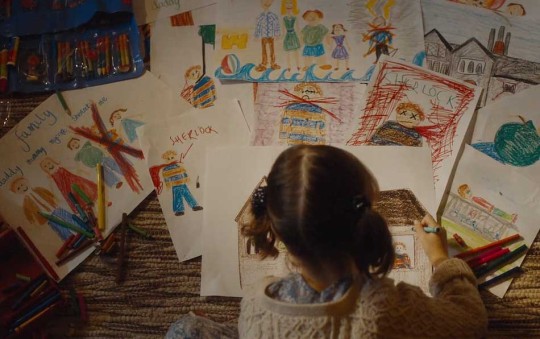
Mycroft made sure Eurus was sent away to an isolated prison/institution (Sherrinford) at an early age.
Their parents seemed absent and not particularly interested in the whereabouts of their own daughter (they didn’t even know she was alive); they let Mycroft and ‘Uncle Rudy’ take care of things, so one could easily suspect she was abandoned.
Eurus seems to have escaped to London at her own leisure, while Mycroft thought she was incarcerated.
Eurus appears in London under three different disguises: “E” (flirting and texting with John),
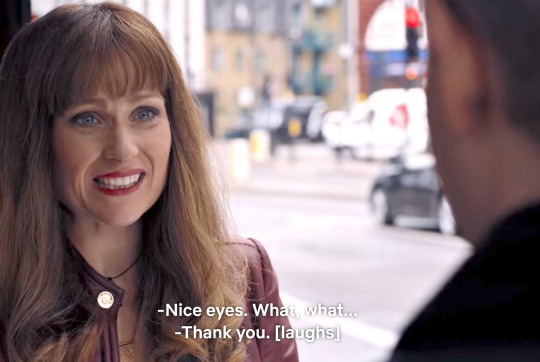
“Faith” (walking the streets of London with Sherlock)
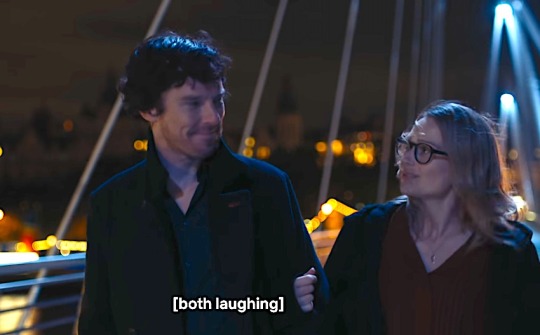
and John’s new therapist.
Eurus makes riddles with codes for Sherlock to decipher (“The cipher was the song”).
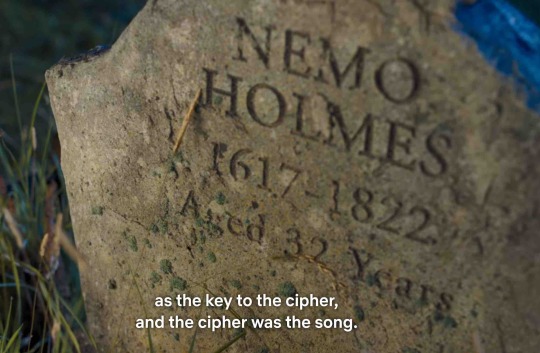
So, one might wonder if the Eurus plot is – at least to some degree – inspired by Enola Holmes? On the other hand, while Eurus appears cold and calculating, Enola is compassionate and sensitive and makes mistakes because of emotional bias. Enola seems more similar to Eurus’ disguised personas than to the supposedly ‘real’ Eurus - the one who burned the family estate down and killed Victor Trevor.
I still believe that Eurus only exists inside Sherlock’s head in BBC Sherlock, being a part of himself, but that’s for another discussion.
As for the Holmes siblings, it’s also interesting that on the ACD Estate’s website, where they have a collection of ’facts’ about ACD’s characters, they seem to have included BBC Sherlock’s Eurus as a valid sibling of Sherlock and Mycroft (scroll down to “Holmes facts” on this page: X), even though this character is nowhere to be found in canon. Please correct me if I’m wrong about this, but the only reference I can find to ”the East Wind” in ACD’s stories is in His Last Bow (LAST, 1917), where Holmes says that ”There’s an east wind coming, Watson”, and goes on to talk about a cold, bitter wind that is threatening England; most probably a reference to WWI, which was raging at the time of publication. No one with the name Eurus is ever mentioned, though. If Eurus had already been part of canon, why would Mofftiss have claimed her to be the big ”rug-pull” in TFP?
I haven’t read the final part in the Enola Holmes series (X) yet, where allegedly Enola reconciles with her brothers (Sherlock in particular) and they end up respecting her independence and skills. But according to several reviews Sherlock softens up a bit in the end. In the parts I have read, the two adult brothers appear rather conservative, patronising and sexist towards their younger sister – indeed more condescending than I think Holmes view of women actually is described in ACD’s original stories (allegedly – we never see him treat women badly in practice, do we?). At any rate, I haven’t this far been able to find a single specific plot element from the ten (supposedly) still copyrighted stories in Springer’s work.
In their lawsuit, the ACD Estate claims that “The Springer novels make extensive infringing use of Conan Doyle’s transformation of Holmes from cold and critical to warm, respectful, and kind in his relationships. Springer places Enola Holmes at the center of the novels and has Holmes initially treat her coolly, then change to respond to her with warmth and kindness.”
So what they’re doing here is the same thing they’ve done before (and lost): they’re claiming they still own some intrinsic characteristics of Sherlock Holmes, even though most of the stories are already in public domain.
Other lawsuits
A similar lawsuit towards Miramax (X) was made in 2015 for the film Mr Holmes, which had Ian McKellen as protagonist. But it ended in settlement before the defendants had responded to the accusations, which were similar to those regarding Enola Holmes about Holmes’ emotional life, but also had to do with the details of Holmes’ life as a retired man.
So, this is not the first time the copyright owners are interfering with content in Holmes adaptations. To complicate things further there seems to be two different estates claiming copyright for Doyle’s work. In 2010 there was some reporting that another estate had threatened Guy Richie’s Sherlock Holmes movies with disapproval after Robert Downey Junior had discussed Holmes possibly being gay on a TV show (X). According to Digital Spy, Andrea Plunket, who then represented the ‘Arthur Conan Doyle Literary Estate’, said: "I hope this is just an example of Mr Downey's black sense of humour. It would be drastic, but I would withdraw permission for more films to be made if they feel that is a theme they wish to bring out in the future. I am not hostile to homosexuals, but I am to anyone who is not true to the spirit of the books."
It’s very unclear which legal rights Andrea Plunket’s family (Andrea apparently died in 2016) actually has to represent ACD’s work, though. Andrea had been married to one of the copyright owners, and her family’s money had paid for the purchase of those rights, but after her divorce Andrea seems to have lost her part in the copyright, according to @mallamun on tumblr: (X). There’s also a lot of interesting things to read about these copyright issues in an article by Mattias Bodström from 2015: (X). However, there’s still a website from ‘Arthur Conan Doyle Literary Estate’ claiming ownership of the stories: X, and they have published a detailed account of their version of the matter (X).
The current case
I have no idea what the court will think about these new accusations against Netflix et al, but to me, if this isn’t farfetched, I don’t know what is. I think a good case could be made for most of these ‘unique’ elements listed above being expressed already before the Case Book. For example, in His Last Bow (LAST, 1917) they use a car, in The Dying Detective (DYIN, 1913) Holmes manages to fool Dr Watson that he’s very sick. When Watson declares his intent to marry for the first time already in The Sign of Four (SIGN, 1890), Holmes resorts to drugs. The dogs are all over the place since day one, and Holmes seems to appreciate them very much, not least Toby in SIGN.
And don’t get me started on the contradictions in Watson’s various discussions of whether Holmes has a heart. Holmes’ actions of helping people often contradicts the image of a cold, emotionless person. The Yellow Face (YELL, 1893) ends with Holmes being deeply repentant for being over-confident in his suspicion of a woman for adultery or maybe worse offences, when she was actually only trying to protect her little daughter from society’s racism.
In the Devil’s Foot (DEVI, 1910) there’s the following conversation (my bolding): “Upon my word, Watson!” said Holmes at last with an unsteady voice, “I owe you both my thanks and an apology. It was an unjustifiable experiment even for one’s self, and doubly so for a friend. I am really very sorry.” “You know,” I answered with some emotion, for I had never seen so much of Holmes’s heart before, “that it is my greatest joy and privilege to help you.”
Why on earth would it be a “surprising artistic decision” from ACD to develop Holmes into a little more caring and openly compassionate person as he grew older? Isn’t that the very classical character development of any literary hero’s journey and also a logical personal development for many people in the real world? It’s called ‘learning’ and ‘maturing’, as far as I know. To claim this is infringement of some unique idea is frankly ridiculous.
In short: They make a very literal, textual interpretation of the Holmes character, cherry-picking the parts that suit their interests, they claim there’s a clear story arc with very separate characteristics before and after WWI, and that they own the end of it. Thus, no adaptation with a progressive story arc regarding Holmes’ character would be permitted without their consent. Since apparently BBC Sherlock have ACD’s Estate’s license for their own franchise, this just makes me wonder how much trouble Mofftiss et al had with including things like Sherlock’s and John’s hug in TLD, or his emotional breakdown with the coffin after Eurus’ experiments on him in TFP.
Possible satirical meaning and small hints
Allow me to speculate a bit about the possible implications of BBC Sherlock in relation to the Estate. In a recent excellent meta by @raggedyblue, the ACD Estate as ‘Doyle’s bank’ is discussed, regarding the significance of the banker Sebastian Wilkes in The Blind Banker (X). Many interesting ideas are presented in this meta, I really recommend a read. This topic also initiated an interesting discussion about Doyle himself mirroring John in this post by @devoursjohnlock (X).
In an addition to that meta @shylockgnomes brings up John’s blog post about Tilly Briggs as another possible reference to the Estate (X). I totally agree with this; some time around the release of BBC Dracula this year, and our discussions about legal issues connected to both shows, I stumbled upon this particular ‘aborted’ blog post and came to realise its possible significance. It gave me the idea to change the title of my own blog to “Tilly Briggs Ship with Johnlock on it”, since I suspect that the blog post might be a clue about legal obstacles to a certain relationship. And that title is staying, at least until we know the true story (if ever).
Canon contains some info about Matilda Briggs is in The Sussex Vampire, one of the late ACD stories that should be in public domain by now, since the copyright supposedly expired in December 2019. But, as shown above, the Estate now claims there’s a three-year lapse when they can still sue for infringement. Here’s the quote from SUSS (my bolding): “Matilda Briggs was not the name of a young woman, Watson,” said Holmes in a reminiscent voice. “It was a ship which is associated with the giant rat of Sumatra, a story for which the world is not yet prepared.” Sumatra, by the way, was Sherlock’s preferred destination in the TST tale of the merchant who met Death in Samarra. In Sherlock’s version, according to Mycroft, the merchant survived and became a pirate... ;-)
John’s aborted blog post (X) is titled “Tilly Briggs Cruise of Terror”, which just might be yet another little jibe at the Estate. John says that “I had to take this post down for a while as the ship's owners are launching an appeal”. According to Jacob Sowersby (a Sherlock fan on the blog) and Mike Stamford, this was “mind-blowing stuff”:
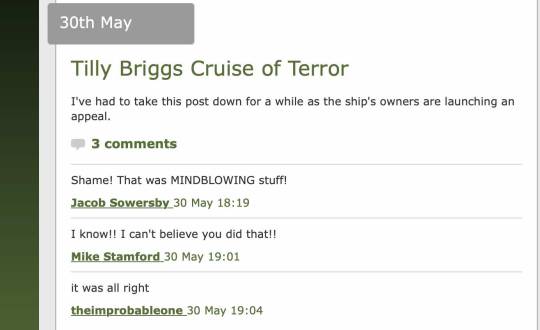
So I can’t help thinking this sounds like a hint to us about the Estate and a certain ‘ship’ which is still partly in their (legal) power and control. In fact, it wouldn’t surprise me if the whole show - on the meta level - is partly meant as a satirical commentary on how Holmes’ and Watson’s characters, and therefore also their relationship, have been treated the last 100+ years by their ‘owners’. A treatment where I believe the hetero norm has always ruled, and where Andrea Plunket’s quote above indicates that homophobia regarding Holmes and Watson is still tied to legal obstacles.
Charles Augustus Magnussen also talks about ownership at the beginning of HLV (thanks for the quotes, Ariane DeVere): “Of course it isn’t blackmail. This is... ownership”. And later in the episode: “It’s all about knowledge. Everything is. Knowing is owning”. In fact, quite a bit of emphasis in HLV is put on Magnussen’s ‘ownership’ of characters people: “I’m a businessman, acquiring assets. You happen to be one of them!” Apparently - as this new lawsuit shows - it’s even possible to make money out of Holmes’ emotions.
@catwillowtree also pointed out, in another additional thread to @raggedyblue’s meta, that Eurus’ burning down Musgrave Hall – the family estate - in TFP also seems like a reference to the ACD Estate. I would add to this, saying that the bomb that didn’t go off in TEH and the “patience grenade” that did go off in TFP might have to do with the same issue. What would happen if the ‘bomb’ of Johnlock would go off before the relevant stories are legally in public domain? Most probably another lawsuit from the Estate, which might become very expensive.
Come to think of it, in TGG Greg Lestrade mentions an estate agent, when Sherlock receives a text message and a phone call on the pink phone from Moriarty: “What the hell are we supposed to make of that? An estate agent’s photo and the bloody Greenwich pips!” Well, if the Estate agent is somehow connected to the five pips, that fandom theory of the pips representing five series in the show comes to mind... For every pip in TGG there’s a victim covered in explosives; a huge bomb threatening to go off. (The third bomb did go off in TGG, but in S3 Sherlock found the ‘off-switch’ in time). If the fifth bomb is to explode in S5, I bet it won’t be until the relevant stories are safely in public domain. 2023?
More wild speculation while I’m at it: Maybe Sherlock and Ajay’s smashing of Thatcher busts in TST also ties in metaphorically to the same topic? The Thatcher era was not easy for LGBTQ people. There are several owners in TST whose Thatcher busts need to be smashed in order for Ajay’s lost memory stick to be recovered. AGRA is referred to as Ajay’s and Mary’s “family”. The memory stick contains personal information, ‘who you really are’. Could be read as if the info of who Sherlock Holmes really is can only be released once certain obstacles are overcome...
In another interesting meta from last year by @yeah-oh-shit (X), they mention the secret underground station at Sumatra road in TEH, where Howard Shilcott tells Sherlock and John that “They built the platforms, even the staircases, but it all got tied up in legal disputes, so they never built the station on the surface.” So maybe S5 is basically already written? It would make sense to me if the long hiatus we’re facing right now has a far more logical reason than the excuses Mofftiss have presented in interviews - the risk of legal disputes with the copyright owners.
Tagging some more people who might be interested: @gosherlocked @ebaeschnbliah @sarahthecoat @sagestreet @thepersianslipper
ETA: I have corrected some details about the copyright owners in this post; thanks @devoursjohnlock for pointing them out!
130 notes
·
View notes
Text
How Dear Evan Hansen Changes the Musical’s Ending
https://ift.tt/2XGJPiD
This article contains Dear Evan Hansen spoilers, both for the movie and the stage show.
No matter how you come to the story of Dear Evan Hansen, and regardless of the medium, things always have to end at the same apple orchard. It’s fitting since Evan’s first major lie about Connor Murphy, the boy who killed himself, was that they spent whole days in the then-abandoned orchard, talking about girls, boats, and whatever other fantasies Evan could concoct. And it’s here that Zoe Murphy, Connor’s younger sister, requests Evan meet her for the story’s final scene.
This is true of the stage show, which took Broadway by storm five years ago—winning six Tonys including for Best Musical and Best Actor for Ben Platt—and it’s the same for the movie, with Platt’s Evan coming to a now renewed orchard and sitting with the cinematic Zoe (Kaitlyn Dever). Among the trees, Evan can see at least one good thing that came out of his lies: The Connor Murphy Project reopened this small slice of paradise.
Yet how Dear Evan Hansen gets to that moment in the movie is drastically different from the stage musical. Then again, so is the world in the five years since the musical’s Broadway debut (and six since it was first performed in Washington D.C.). Hence why director Stephen Chbosky and screenwriter Steven Levenson, who adapted his own book from the stage, have attempted to adjust to our current social climate. The new ending addresses the harshest criticisms about the Evan Hansen character, and the values his tale might promote. This is, after all, a musical about a troubled young man who exploits the suicide of a stranger in his school to increase his popularity and to insinuate himself into the dead boy’s family.
But is the new ending an actual improvement? Well…
How Dear Evan Hansen Ends on Stage
The entire narrative of Dear Evan Hansen pivots on a misunderstanding between Evan and the Murphy family as the latter grieve over the suicide of Connor. When Connor’s parents, Cynthia and Larry, first misconstrue Evan’s letter to himself as their son’s suicide note, Evan attempts to correct them. However, they seem so heartbroken, and Evan is so desperate to please and be accepted—by anyone—he quickly goes along with it and begins spinning tales about his and Connor’s intimate friendship.
The musical is thus a rising crescendo that builds as Evan climbs higher and higher off his mistruths. So the inevitable moment where his house of cards comes crashing down is the narrative’s real climax. And yet, in the original version of Dear Evan Hansen, the story more or less ends right there. After Evan confesses in the song “Words Fail” that he lied about the letter and his entire friendship with Connor, the horrified Murphys walk away from him one by one, with various degrees of disgust. He then comes clean to his mother in the final big song of the show, “So Big / So Small,” where she comforts her son. She’ll never walk away.
The musical then quickly jumps one year into the future, with Evan revealed to be working part-time and attending community college, hoping to save up enough money to someday attend a university. Zoe, who’s now a senior in high school, invites Evan to the orchard where he thanks her family for never revealing his secret to the public—never telling the world he lied about Connor. And, rather incredulously, Zoe absolves Evan and the audience of any guilt. She says, “Everybody needed [the lie] for something.” She even goes so far to say it “saved my parents.” It brought her family closer together.
So while it’s still bittersweet since Evan’s relationship with the Murphys, including Zoe, is forever severed, there are still no real consequences for Evan other than Cynthia and Larry won’t pay for his college education. Even his guilt is assuaged, and he can brag to Zoe that he’s been reading the 10 books Connor said were his favorites in eighth grade. The show more or less ends in a figurative group hug by omitting through a time jump all of the messy fallout from his choices.
How Dear Evan Hansen the Movie Ends
In the film, “Words Fail” is still the climax of the story, with Evan confessing his sins and Zoe walking away. However, in one telling addition, Cynthia (played with delicate fragility by Amy Adams) is barely able to whisper, “I think it’s time for you to leave” while holding back tears. Since she was Evan’s biggest champion, that she is now the one who states explicitly he is disinvited from their home hits hardest.
Then after Evan’s heart-to-heart with his mother (Julianne Moore), we actually see Evan attempt to make amends for his misdeeds. For starters, the whole reason the truth finally came out in both versions of the story is because of the machinations of a schoolmate named Alana (Amandla Stenberg in the film), who accidentally unleashed a whole social media mob on the Murphys, with randos on the internet blaming the parents for Connor’s suicide.
On stage, this plot element is entirely dropped after Evan confesses to the Murphys, who presumably bear the brunt of the social media hate in quiet while protecting Evan’s secret. In the film though, Evan actually attempts to talk to Zoe in school the following week and she asks him to leave her alone. She also reveals the only reason her parents haven’t unmasked what Evan did is because “they’re afraid you’ll do something to yourself.” Like Connor.
Thus Evan gets on Twitter that night and tells the world, “[The Murphys] don’t deserve your hate. I do.” He confesses. Afterward, he again becomes a high school pariah, but we learn in montage he is more content this way as he tries to make further amends to the Murphys by not only reading Connor’s favorite books but tracking down someone’s phone video of Connor during his stint in rehab. Evan even finds footage of Connor playing his guitar, a feat he hid from his parents. The new song “A Little Closer,” which scores the final montage, is revealed to be a melody Connor wrote and sang in rehab, and Evan is able to at least mail that to Connor’s parents. He’s finally given them something true that they didn’t know about their son.
Only then, before the current school year ends, does Zoe invite Evan to an apple orchard and they reminisce about what might’ve been.
Does It Improve Evan Hansen and the Story?
The clear implication for adding these sequences, plus a song that the real Connor Murphy character can sing, is intended to fix the moral and thematic slipperiness at the heart of Dear Evan Hansen. Through a series of hummable ballads by songwriters Benji Pasek and Justin Paul, and some heartbreaking performances, including by Platt in the original cast, the stage production relies on the power of its emotions to overwhelm logic or deeper analysis. Some might even say it manipulates.
Yet over the years, the musical has had its fair share of detractors who pointed out how calculating and toxic the Evan Hansen character can appear. And the fact the musical just ends on the emotional high point without actually bothering to sift through the wreckage of what Evan did has always been a cheat.
Conversely, there are a few fleeting sequences in the stage version where the musical at least briefly seems to consider its darker implications. Evan’s loose group of (bad) friends in Alana and Jared contribute to this element in the song “Good for You,” where they sing in unison, “Well, I guess if I’m not of use, go ahead, you can cut me loose. Go ahead now, I won’t mind.”
The Alana relationship is particularly interesting in the show since it is only after she demands of Evan “how” will he raise $17,000 that he shows her Connor’s “suicide note.” He immediately protests after she decides to post it online, but did he not on some level show it to her in order for her to use it to raise $17,000 and reopen the apple orchard? After this scene, Alana ghosts him, suggesting she was herself only using Evan to brandish her social clout in the school and, eventually, her college applications.
The Dear Evan Hansen movie tries to wipe even this thorniness away. The context of Evan showing the note to Alana is handled slightly differently, but as a consequence there’s no ambiguity on why he showed it to her—he did not intend for her to share it online. She also, like Evan, is softened around the edges when she does answer Evan’s ringing phone on-screen and cries that she tried to take the letter down but it’s still all over social media.
The logic behind the change would seem to make both Evan and Alana more purely sympathetic and blameless for their mistakes. In Alana’s case, she isn’t a master manipulator, and in Evan’s case it is beyond his control when others take things too far. He then puts in the work to help the Murphys, beginning by admitting to the world his dishonesty.
Read more
Movies
Will Steven Spielberg’s West Side Story Reignite Love for Movie Musicals?
By David Crow
TV
Hawkeye Trailer Finally Brings Captain America Musical to the Stage
By David Crow
These were obviously conscious choices made after the five years and full lifetime which passed since 2016—a year where Barack Obama was still president and the #MeToo movement hadn’t yet occurred. Now in an age where social accountability, especially in online life, and alleged authenticity are valued more than ever, having a hero who lies to the world and gets away with it is inherently problematic. So the flaws in Evan’s choices, and even Alana’s, are “fixed” with crocodile tears of regret from Alana, and then Evan making an actual effort to atone for his mistakes.
Yet I would argue it doesn’t actually improve the fundamental issues with the musical. In the case of Alana, having a character show the ugly side of social manipulation, even among ostensibly sympathetic figures, was one of the truer impulses in a story that otherwise glorifies the healing power of finding validation from strangers on the internet. While both the film and show also depict the downside of online life with a discordant singing hydra coming after the Murphys, it’s only because of a couple of misguided mistakes. And in the case of the stage show, the larger message is Evan’s musical platitudes are simply too powerful (or profitable) for the Murphys to shatter.
In 2021, Evan and his creators make the choice that he can admit his mistakes. Yet the story still attempts to justify Evan’s actions, which ironically puts the film at odds with itself. It basks in the splendor of Evan’s self-help ballad, “You Will Be Found,” and then shows him suffering comeuppance for lying—even if Zoe still gives him final absolution.
The one significant change that clicks for me is Evan at least seeking out some hidden truth about Connor, and sharing it with the real people who actually loved him instead of strangers, who in turn would only again offer performative gestures and signaled virtue toward a kid they otherwise ignored. Hearing Colton Ryan’s Connor sing for himself—for the first time in any medium—and not merely be a puppet for Evan’s self-serving fantasies was a significant, moving improvement over how this thread is resolved on the stage.
Still, I think going further in that direction with Evan realizing the crassness of what he created, and the emptiness of his bromides, would’ve made this a more interesting narrative. But what do I know? My instincts wouldn’t have turned this into a Broadway anthem for Generation Z. So how about yourself? Do you like the new ending to Dear Evan Hansen?
cnx.cmd.push(function() { cnx({ playerId: "106e33c0-3911-473c-b599-b1426db57530", }).render("0270c398a82f44f49c23c16122516796"); });
The post How Dear Evan Hansen Changes the Musical’s Ending appeared first on Den of Geek.
from Den of Geek https://ift.tt/2ZlN281
2 notes
·
View notes